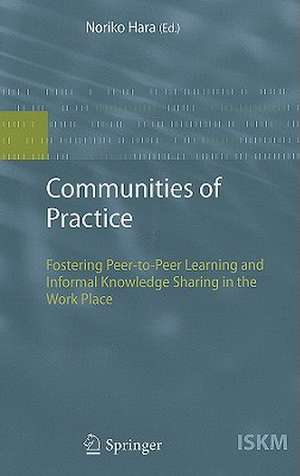Communities of Practice: Fostering Peer-to-Peer Learning and Informal Knowledge Sharing in the Work Place: Information Science and Knowledge Management, cartea 13
Autor Noriko Haraen Limba Engleză Hardback – 13 oct 2008
| Toate formatele și edițiile | Preț | Express |
|---|---|---|
| Paperback (1) | 638.37 lei 6-8 săpt. | |
| Springer Berlin, Heidelberg – 17 noi 2010 | 638.37 lei 6-8 săpt. | |
| Hardback (1) | 643.50 lei 6-8 săpt. | |
| Springer Berlin, Heidelberg – 13 oct 2008 | 643.50 lei 6-8 săpt. |
Din seria Information Science and Knowledge Management
- 15%
 Preț: 631.21 lei
Preț: 631.21 lei - 20%
 Preț: 636.88 lei
Preț: 636.88 lei - 20%
 Preț: 998.54 lei
Preț: 998.54 lei - 15%
 Preț: 644.95 lei
Preț: 644.95 lei - 18%
 Preț: 953.20 lei
Preț: 953.20 lei - 20%
 Preț: 653.38 lei
Preț: 653.38 lei - 20%
 Preț: 645.97 lei
Preț: 645.97 lei - 20%
 Preț: 650.40 lei
Preț: 650.40 lei - 20%
 Preț: 323.67 lei
Preț: 323.67 lei - 20%
 Preț: 990.80 lei
Preț: 990.80 lei - 20%
 Preț: 649.75 lei
Preț: 649.75 lei - 20%
 Preț: 647.79 lei
Preț: 647.79 lei - 18%
 Preț: 1223.43 lei
Preț: 1223.43 lei - 20%
 Preț: 650.08 lei
Preț: 650.08 lei - 15%
 Preț: 651.19 lei
Preț: 651.19 lei
Preț: 643.50 lei
Preț vechi: 804.37 lei
-20% Nou
Puncte Express: 965
Preț estimativ în valută:
123.13€ • 128.91$ • 101.88£
123.13€ • 128.91$ • 101.88£
Carte tipărită la comandă
Livrare economică 05-19 aprilie
Preluare comenzi: 021 569.72.76
Specificații
ISBN-13: 9783540854234
ISBN-10: 3540854231
Pagini: 152
Ilustrații: XII, 138 p. 4 illus.
Dimensiuni: 155 x 235 x 15 mm
Greutate: 0.36 kg
Ediția:2009
Editura: Springer Berlin, Heidelberg
Colecția Springer
Seria Information Science and Knowledge Management
Locul publicării:Berlin, Heidelberg, Germany
ISBN-10: 3540854231
Pagini: 152
Ilustrații: XII, 138 p. 4 illus.
Dimensiuni: 155 x 235 x 15 mm
Greutate: 0.36 kg
Ediția:2009
Editura: Springer Berlin, Heidelberg
Colecția Springer
Seria Information Science and Knowledge Management
Locul publicării:Berlin, Heidelberg, Germany
Public țintă
ResearchCuprins
Theoretical Foundation.- Ethnographic Accounts of a Community of Practice in Square County.- Characteristics of a Community of Practice in Square County.- Communities of Practice and Information Technologies in the Circle County Public Defender’s Office.- Online Communities of Practice: Beyond Organizational Boundaries.- Toward an Understanding of Communities of Practice.
Recenzii
For two decades or more managers and theorists have argued about the role of Communities of Practice (CoPs) in Knowledge Management: how and why do they work or not work? can or should they be managed? do they or do they not contribute to sustained learning? This lucid and compelling book clears up the mess. After setting the theoretic scene, Hara uses her considerable skill as a trained ethnographer to provide accounts of CoPs in action, observing and reporting on the work of both face-to-face and online communities. She shows how CoPs produce, sustain and develop cultural knowledge in a process of localized organizational learning that supports members through good times and bad. Hara is a talented writer: the extended accounts of work in Public Defender work in two different County Courts are compelling reading. Specialists and non-specialists alike can learn from this text: Hara’s emphasis on identity and culture and her findings on the specific and varied effects of IT in Communities of Practice are important contributions to thinking about KM.
Elisabeth Davenport
Professor Emeritus
Napier University, Edinburgh
Elisabeth Davenport
Professor Emeritus
Napier University, Edinburgh
Textul de pe ultima copertă
The book offers two themes: one is about Communities of Practice (CoPs) and learning, the other is about social informatics approaches. First, in order to facilitate designing effective learning environments both online and offline, this book calls attention to the importance of CoPs to facilitate informal learning as part of professional development. Communities of Practice are informal networks that support a group of practitioners to develop a shared meaning and engage in knowledge building among the members. The concept of CoPs is rooted in situated cognition (Brown, Collins, & Duguid, 1989; Lave, 1988) and the socio-cultural theory (Vygotsky, 1978).
The book examines how people share and construct their knowledge by using case studies of public defender’s offices. Despite strong interests among practitioners and scholars, empirical studies of CoPs are sparse. Drawing on theories from situated cognition and social informatics, this book investigates what constitutes a community of practice and how members of the community create a shared meaning in workplaces with and without IT.
The book examines how people share and construct their knowledge by using case studies of public defender’s offices. Despite strong interests among practitioners and scholars, empirical studies of CoPs are sparse. Drawing on theories from situated cognition and social informatics, this book investigates what constitutes a community of practice and how members of the community create a shared meaning in workplaces with and without IT.
Caracteristici
New methods of informal learning with Co. Includes supplementary material: sn.pub/extras















